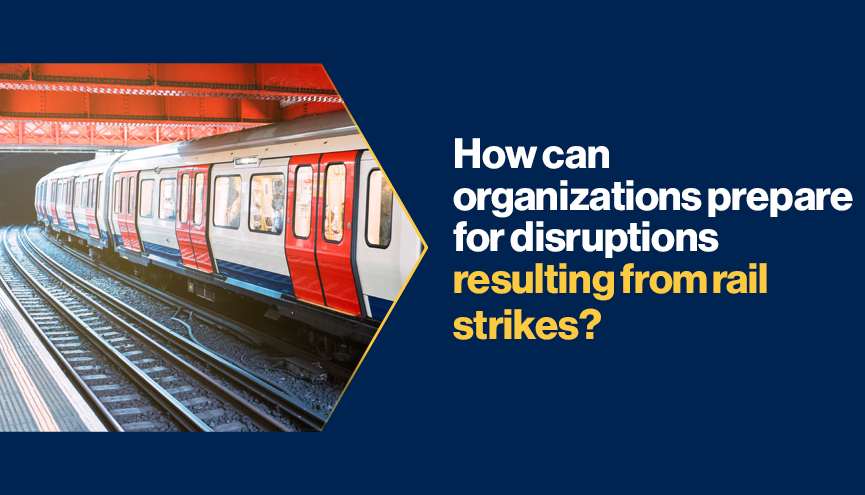How can organizations prepare for disruptions resulting from rail strikes?

As rail workers in the UK vote to enact strike action this summer, we take a look at the impact this could have on organizations and how organizations can plan for the impact of industrial action on their own operations.
The national strikes are likely to take place on 21, 23, 25 June, with some referencing it as one of the largest scale rail strikes seen in modern history. Some London Underground workers are also expected to walk out on the first day of the strike. The BBC reports that “around a fifth of mainline rail services [will be] running on the strike days, with the majority operating for a maximum of 12 hours.”[1]
During a period of already increased disruption to the travel industry and global supply chains, the impact of these strike on organizations may be significant if they go ahead.
How will this impact freight/supply chains?
Taking a look at supply chains first, any organizations which use rail freight to transport critical goods for their business operations will need to consider the potential impact on operations this strike could have.
“The pattern of proposed strike action is about as bad as it gets for rail freight, with disruption likely across the entire week and into the weekend. Even with the plans that are in place, supply chains will be impacted, and it is really damaging to customer confidence in rail, and to future growth,” said Rail Freight Group’s Director General, Maggie Simpson.
There are ongoing discussions about prioritising freight transport on the railways to ensure the delivery of critical items, such as fuel for power stations and aircraft, as well as food for supermarkets. However, it is currently unclear how this would take place and to what extent this is achievable, so any reliance on this would be unwise at this stage. In what is likely to be a week-long period of travel disruption, those products which need to remain fresh and those organizations that are without adequate stock levels for whatever reason could be the most affected.
Business travel
Organizations whose workers have returned to the office and those whose work can’t be achieved remotely, will also face disruption from the strike action.
However, it is likely beneficial for many organizations that this action is taking place after the pandemic, rather than before it. Those with hybrid/remote work structures can continue on this basis and those who have implemented a return to office policy will likely still have a response plan in place for those staff members who cannot return.
Although, this type of event is likely to impact consumer confidence on travel networks and, alongside the wide-scale travel disruption expected over the summer, could be another event amongst others that stalls a return to full-time office working.
How should strikes be handled?
The strike has also called into question how these types of events should be handled for the minimum amount of disruption for all involved.
Indeed, the UK government has highlighted the possibility of introducing laws imposing minimum service levels on the railways to ensure some services could still take place. Although, this has a risk of inflaming the threat of strikes even further as it could be seen as impinging on the right to strike.
With regard to minimising disruption from strikes, a large organization may consider moving staff from non-critical services to keep its essential operations running in a normal situation, if no contractual issues are posed by this. However, in this circumstance the widespread scale of the strike may restrict where these employees can be sourced, with the safety of the railway lines paramount for all parties.
Of course, there is also the importance of opening a dialogue on both sides to see if a satisfactory resolution can be found. As such, as of 7 June, Network Rail is reportedly still in discussions with the trade unions to discuss an outcome which avoids strike action[2].
[1] https://www.bbc.co.uk/news/business-61723515
[2] https://www.networkrailmediacentre.co.uk/news/talks-continue-in-rail-dispute









































